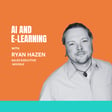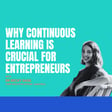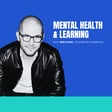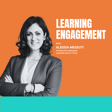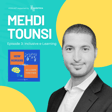Become a Creator today!Start creating today - Share your story with the world!
Start for free
00:00:00
00:00:01

Humans & AI Learning Together
In this episode, we explore how humans and machines learn, and how they complement each other. We discuss practical examples of AI-in-learning, and an optimistic future where every trainer has a virtual assistant and every learner has a virtual coach.
Featuring Gamoteca founder Atish Gonsalves.
Transcript
Oxford Learning Environment Overview
00:00:00
Speaker
The last classroom I was in was at the University of Oxford, where I dragged heavy printed textbooks around wherever my study group was meeting, whether that be the college or the pub. And my study group consisted of humans from all over the world. It was the perfect introduction to what human-connected e-learning is all about, bringing together people from different time zones and experiences to learn from each other.
AI in Modern Learning with Atish Gonzalez
00:00:25
Speaker
But what happens when one of those fellow students you learn best from
00:00:30
Speaker
happens to have the initials AI. We're going to explore the role AI is playing in learning today with Atish Gonzalez.
00:00:39
Speaker
You're listening to How Humans E-Learn Together, discussing the impact human-connected interactive experiences have on the human capacity to learn. This is a podcast for trainers, educators, learning and development professionals, coaches and mentors, the education technology community, and anyone who wants to leverage new ways to reach lifelong learners. And a look at what others in the e-learning industry are doing to make that happen.
00:01:08
Speaker
Today I'm speaking with Atish Gonsalves. Hi Lauren. Atish is the founder of Gamoteca and also leads education innovation at the International Rescue Committee. So what is human connection? As you said it sounds like something very nice but it can also be something quite vague.
00:01:24
Speaker
I'm going to let Ateesh introduce himself. I'm Ateesh Gonsalves. I'm the founder of GemaTeca. I also lead education innovation at the International Rescue Committee.
Founding Gamoteca and Emergency Training
00:01:35
Speaker
And I have been working in the space of education, technology, and social impact for the last 15 or so years, moving between a number of countries, but also moving broadly between the United Nations, nonprofits like Save the Children and IRC,
00:01:52
Speaker
and also the private sector, so working with edtech companies, as well as launching my own startup, Gamoteca. Let's start with why did you found Gamoteca? Where did the idea first come from?
00:02:03
Speaker
So a few years ago, when I was working with UNHCR, that's the UN refugee agency, we were researching and testing solutions that could help staff members respond in difficult situations. So when there was a security incident or how you could get them to better plan for an emergency situation. And at that time, the only options that the team had were either very costly in-person simulations where they essentially brought in
00:02:33
Speaker
a bunch of actors and choreographers who would essentially recreate what would happen if something went wrong and they would put people in teams and they would get them to react to these different types of fake situations and see how a star responded and then gave them problems where they could improve.
00:02:53
Speaker
And then on the other side, the digital learning that existed at the time was mainly our point type of, what I would call a PowerPoint on steroids, e-learning. So where you click through different screens and it'll tell you what to do in such a situation.
00:03:07
Speaker
So what we were trying to look for was a way to train people to better react in these types of complex situations, but do so while working in a team, being able to collect feedback and making all of this ideally a bit more cost-effective than the way it was being rolled out at the moment. So we started to bring in technology to orchestrate how people would go through these kinds of simulations. And so we started a research project with the Open University of the Netherlands to test
00:03:36
Speaker
the use of augmented reality at the time, and found that when people are working together in teams, when they are giving each other feedback, and when they have the opportunity to practice the skills, that's when the learning is the most impactful. So that was the genesis of Gamoteca. There was a few research papers published with UNHCR and the Open University of the Netherlands.
00:04:00
Speaker
And from then on with a number of other early partners, like the International Training Center of the International Labour Organization, we've run a number of pilots focusing on the increased use of human connection and collaboration in digital learning. So that's been sort of a long, long way to explain sort of where Game of Tech came from, but it was really with this driver of creating opportunities for people to learn together.
00:04:24
Speaker
And to have human connection, right? Cause that's, I think a lot of the core research that you did when this idea first came
Human Connection in Digital Learning
00:04:30
Speaker
to light. So talking a lot about human connection, can you tell us why it's important and what it means in a practical sense? It sounds like a great slogan that I want to put on a t-shirt, but what does it actually mean? So originally our focus was more on gamification and serious games. And that was the original research looking at how people react better when they are going to be sort of serious games.
00:04:53
Speaker
But over the few years that we've been deploying GimmeTaker, we found the actual secret source in all of this was human connection. So human connection and digital learning for us is how do you bring in some of those elements that people traditionally associate with face-to-face experiences? So if you think about going to a training workshop, for example, you think about all the knowledge and information you get there,
00:05:17
Speaker
But you also think about the connections you form. If you think about the opportunities to practice some of the theory that you've just gotten from that training, you have the opportunity to get feedback from other trainers, from other learners in that room.
00:05:34
Speaker
So what we've been trying to do is trying to bring that human connection, which you'd normally associate with that type of face-to-face training, into the digital realm. So this could take the shape of simulations where people know it's not a real situation. So think of a fire safety or a security training.
00:05:56
Speaker
People know it's not a real life situation, but they're still acting it out to build muscle memory on how to react when something does go wrong. It could take the shape of people just practicing different skills. So we have a great learning experience on Guillermo Techo on learning sign language. So you could just learn the basics by watching a video about basic sign expressions and fingerspelling your name.
00:06:23
Speaker
But the way you're going to really internalize that is by practicing. And we know this about learning that just getting a theory is not enough. So the human connection there is helping you to take that theory, be able to practice it, but sharing it importantly with another learner, with a mentor, with a teacher, and getting feedback.
00:06:46
Speaker
But I think importantly, it's also just building that mutual accountability as well. So I think we learn best when we're learning together with other people. So we don't go to university to learn alone. We go there to learn with others in a group. And I think that's that important part, which doesn't necessarily tie directly to learning outcomes, but is an important part of how we learn.
00:07:07
Speaker
Right, so you basically just gave us the history of learning and the way in which people work, and especially why human connection is important, but on an individual level, let's start with how does a human learn?
00:07:21
Speaker
So I think that there are different ways to describe how humans learn. I think the way I would describe it is it's a combination of knowledge. It's a combination of the ability to take that knowledge and apply it. There's a combination of
00:07:40
Speaker
collecting feedback for how you are applying that knowledge and it's just how you learn together with others. So if we think about how we learn as children, we don't really go and do an online course. We just start to walk. We make mistakes.
00:07:57
Speaker
But we do have feedback from our parents or those around us helping us along the way. So human beings have always found a way to learn way before schools existed, way before universities existed, way before even AI existed. So the key ingredient here was doing, making mistakes, but also taking that lived experience of the human beings around you, which usually would get passed down through the generations.
00:08:24
Speaker
And that sort of lived experience is what we've been codifying over the last few years through books and educational institutions. But I think we've lost a little bit outside of that codified knowledge, all of that sort of the experiences we get by being in the environment we are, where we are given the safest place to play and make mistakes and receive feedback from the community around us. So in my opinion, I think that's how learning really works is where
00:08:53
Speaker
It's not just the codified knowledge that you're downloading into yourself, but it's also creating those opportunities to be able to practice, to be able to get feedback, and to be able to work together alongside other humans. Because in real life, even if you learn individually, you're going to work most likely in a space with other humans. So it is important that you start to bring those other humans as well into their learning process. Yeah, we're never really going to escape
00:09:20
Speaker
being around other humans. So we might as well learn from each other, except if we start working with machines. So let's talk about how do machines learn? So machine learning is a subset of artificial intelligence. So when we'll, I'm sure we'll get into AI later on in the conversation.
00:09:40
Speaker
Machines traditionally have learned in a way that humans have programmed them to operate. So starting from very early machines, we designed them to operate in certain ways, and we usually built logical decision points, logical programming ways to make them operate in a way that we wanted them
Understanding Machine Learning
00:10:04
Speaker
to.
00:10:05
Speaker
So that's traditionally how machines have learned from their instructions that the humans coded into them. What's been changing over the last few years with machines has been the introduction of AI and machine learning more generally, where the machines can be programmed to also learn from the data that they are observing, collecting, being fed into.
00:10:30
Speaker
So in a sense, they are starting to learn a bit by themselves as well. So think about self-driving cars or think about Google search. So let's start with self-driving cars. Initially, they tried to train cars, they tried to program cars on how to drive themselves with limited success.
00:10:51
Speaker
Then they just essentially made cars drive on roads or in simulators and made them just make mistakes, obviously in safe spaces, and made them collect data on how that driving was going. And so the mistakes they were making and they were using that to improve the, they're using those data points to improve the driving of the car. Similarly with Google search and other recommendation engines like Netflix and Amazon.
00:11:18
Speaker
They start to pick up patterns on how we are using them, how others are using them. And then all this vast amount of data that they are capturing, they're using that to then start to find patterns. And those patterns are essentially what creates what looks like to us as intelligence.
00:11:35
Speaker
So when you start typing something into Google and it starts completing sentences for you, or you're on Amazon or Netflix and starts making recommendations, which seem uncannily like something that you would pick yourself, it's because it's been looking at the patterns for previous types of content that you've been looking at the path.
00:11:53
Speaker
So this is how machines learn machines learn by looking at vast amounts of data but looking at patterns and i think in some ways i prefer to describe artificial intelligence as pattern recognition and pattern matching because sometimes the artificial intelligence starts to put ideas into people's minds about the machines being bit more human but in reality they're very good
00:12:15
Speaker
baton finding mechanisms. From what you were just describing, the visual that comes to my mind is I just recently binge watched The Mandalorian and IG-11, if anyone watched it, you know that this was a droid, right? So we always think of machines as these, not pattern machines, but like these actual physical robots, right? And it's one of these droids that was programmed to kill the baby Yoda, but then later on was reprogrammed to protect the baby Yoda.
00:12:41
Speaker
And I think that's like for me, that's one of the biggest examples of how we can. Rewire we can use machines to learn and like they can learn differently and we can learn from them. So I know that we're not all going to be able to get an IG 11 in our homes, hopefully, because God only knows if they were programmed one way, how that would go, but.
AI's Role in Personalized Education
00:13:03
Speaker
where do you see opportunities for AI in learning? And is AI going to be helpful for educators or learners or both? Or is it actually going to be harmful? So I'll start with the simpler opportunities for AI and learning, which we've probably already been encountering. So again, going back, let's say to the Netflix or Amazon type of analogy, recommendations. So if you go onto a platform like Coursera or edX or Khan Academy,
00:13:33
Speaker
The kinds of recommendations that these platforms can now make, if you've been a regular learner or you've put in some type of a profile of your preferences, is then based not just on what you've put in, but also based on other data that is seen from other learners anonymously as well. So it can start to make very good recommendations, but especially as you use the platform more, you will get the recommendations will get even better because the machine is learning your profile.
00:14:02
Speaker
So that's the simplest sort of use of AI in learning. Then building a bit more complicated from there, a bit more complex scenarios from there, you start to look at personalization within the learning itself. So a good example of this is Duolingo. I love Duolingo.
00:14:18
Speaker
So if you've used earlier to try to learn a language as I've successfully done, you will go through the different levels. And as you start to just use the platform, you will practice different phrases and you will, you will complete different exercises.
00:14:33
Speaker
The platform will start to understand your level at the language and will start to make recommendations within the learning itself of where you should be. So it'll give you either more difficult exercises if it's starting to pick up that you are good at language or it'll go easy on you if you are struggling.
00:14:52
Speaker
So that's really within course personalization where AI can be super helpful. And then moving beyond personalization and recommendations with the introduction of large language model AI. So that's for those of you who've heard of chat GPT, which is all the buzz at the moment, where the systems can take again large amounts of text and then have more natural conversations or come up with content which seems it's been written by a human.
00:15:22
Speaker
The opportunities using that kind of AI is super helpful because it can then start to do things like provide coaching opportunities. So you could be going through your course and then you could be getting quite personalized coaching assistance as you go through the program. So it could be some words of encouragement. It could be very specific feedback around the areas where you can grow or improve
00:15:47
Speaker
So that personalized coaching could also offer a huge amount of support to the learner. And then for the educators, this opens up a whole range of opportunities to make lives easy for the educators to be able to really target and support individual learner needs. Think of a teacher or an educator who's dealing with a classroom size of about 100.
00:16:09
Speaker
How on earth are they going to know where the different learners in their group are at that point? So the AI could then help to say that these 10 are doing really well, and you just need to keep encouraging them. But these 20 in the group are really struggling, and these are the areas where they are struggling. And it can send nudges, not just to the learners, but it can send nudges to the teacher or the educator, and they can then provide the sort of personalized support to the learner as well.
00:16:38
Speaker
So it starts to really help teachers as well in terms of the personalization bit. And then in terms of content creation. So if you are, if you're trying to design a new training, or you try to design a new activity in a face to face or online training, and you're just running out of ideas. So you can use these kind of tools also to suggest interesting learning structures for how you should design the course, it could suggest icebreaker activities.
00:17:04
Speaker
And what's getting really interesting in the space of a global context in which we work, it could help the trainers not just translate the content, but actually localize it to different contexts. So this means not just linguistically translating the content, but also adapting the country in which the case study is based or the names of the characters, et cetera. So there's a huge amount of potential in really localizing in a very effective way content for other countries and geographies.
00:17:32
Speaker
Amazing. Sign me up. I mean, literally that sounds like the best tool that anyone who's a creative person like myself could use in a productive way. But I also appreciate that not everything about using AI can have so many benefits to it.
00:17:48
Speaker
If anyone listened to our series on episode one, one of the tools that we talked about when it came to slow learning was Socratic walks. And I go on these occasionally with a friend of mine and his son is in school. And they've just eliminated homework because of chat GBT, basically, because
00:18:05
Speaker
they've decided that people can't submit essays anymore. So it's obviously got a lot of buzz and it's disrupting education and classrooms, especially with students being able to generate perfect essays that are indistinguishable from one penned by a human.
00:18:21
Speaker
Do you think that that's going to be a problem? I think that is a problem, but maybe it's not a problem for chat GPT here.
Evolving Education Assessments
00:18:28
Speaker
I think it's a problem in how we're assessing an education. This is not something which hasn't happened before.
00:18:37
Speaker
So I grew up in India, in the education system there, and whilst quite a bit of the world had moved towards calculators, we were not allowed to use calculators in school. They saw it somehow as being able to cheat in the classroom when solving math problems.
00:18:54
Speaker
So I think that there are similarities then in terms of how calculators are perceived as a tool in most education systems and just considered okay to use them, particularly for scientific when you're generating logs, for example, rather than getting students to manually find the answers out in a logbook or trying to crunch their numbers yourself.
00:19:14
Speaker
So I think it's similar in the sense that the education system has been designed around assessing local learning. And so we do need to move away from that and find ways to assess skills that are relevant for the world we live in today, which is much more around problem solving, which is much more on creativity, which is much more around working in cross-disciplinary teams.
00:19:39
Speaker
and this I don't think can be assessed through a hundred word essay. I think essays can still be useful but it could be maybe interesting to ask students to get chat GPT to generate an essay and for them to do a bit of a critical analysis on what chat GPT is produced but combine that with using that essay
00:20:00
Speaker
together with a team member and come up with some other type of solution as well. So I think we need to really think about how we are assessing students, whether it's in the K to 12 space, whether it's at the university level, whether it's in adult learning, in corporate training. So we really need to think differently about education. So I don't think that it's a problem. I think it's more a problem of assessment, how we assess. And I think we need to think both in terms of how AI can help with the assessment, but also how we think about
00:20:30
Speaker
assessments which involve actually assessing the competency that people will use in the workspace. So if we are training people, for example, around communication, it's fine to get them to write an interesting essay, but perhaps it's better to get them to
00:20:49
Speaker
to do an actual pitch in a way that they will end up having to pitch at some point in their life, a business idea or their first startup idea, wouldn't that be a better assessment from them than writing an essay about the problem? So I think there are different ways we can think about it. And I think there are new technologies that enable new forms of assessment rather than thinking about should education play catch up with some of these tools.
00:21:20
Speaker
Yeah, I can understand that. The idea of homework in general has to change because we're moving forward as a society and learning can still continue without having to author your own essays at home. So therefore, how can we use generative AI tools in education in a positive way?
00:21:41
Speaker
So education is going to be one of the biggest challenges after, I think, climate change that the world has to deal with. So this is right from early ages, in early childhood, right up to university. If universities will even exist in the future, right up to continuous learning in the workplace.
00:22:03
Speaker
The types of jobs are changing. It's a much more global economy. Artificial intelligence is starting to eat into a number of jobs as well. So I think we really need to think about education in a very different way. So I think there's a tremendous potential for these tools to really narrow the opportunity gap in education. There's so many students who need to be in education. There's so many workers who need to have their skills.
00:22:29
Speaker
upskilled, they need to be upskilled, and we just are not up to the challenge. So I think tools like this can really help to scale up some of those education needs that are there, that provide very simple and easy to use tools that are really tailored to the needs of the learner. So no point sending someone who's been working as a mechanic for 20 years to retool them on how to work now with, let's say, self-driving cars or with electric cars,
00:22:57
Speaker
back to university, why not train them on something which is really personalized to their skill sets, what they're really good at. And I think that's where these tools can really help in really finding the perfect curriculum and the perfect sort of upskilling solution for that individual. I think, in my opinion, the most optimistic scenario is a future where all teachers have some type of a virtual teaching assistant that can really help them because there's a big burden on teachers, there's a big burden on trainers and on educators.
00:23:27
Speaker
And at the same time that there is every student has ability to have some type of a personalized tutor who can help them along the way as well. So that we have really engaging learning, but we also...
00:23:38
Speaker
can avoid huge dropouts as well. So if you look at e-learning rates, there's very poor completion rates in a lot of online training. There's high dropout rates in university. So these tools can really help in re-engaging and engaging in a very personalized level to ensure that learning is both effective and impactful, but also that learners get through these learning interventions
Ethics of AI in Education
00:24:02
Speaker
as well.
00:24:02
Speaker
There are risks around a lot of these things too, and I think we have to be careful to put in strong guardrails around these AI, make sure that this is done ethically, that learners are aware that they're interacting with AI when they are learning.
00:24:17
Speaker
We should not be disingenuous when we are, for example, presenting a virtual tutor to the students. We shouldn't pretend that that is a real human being on the other side. We should be clear when they're interacting with human beings. We should be clear when they're interacting with AI.
00:24:33
Speaker
but that they can see the benefit on how they can use these tools because then if they're interacting with these tools during their learning experiences, then they're more likely to use these tools than in their work experiences which will make them much more productive in what they're trying to achieve because there's no world.
00:24:51
Speaker
in the coming years where AI is not embedded into every discipline from healthcare to education to manufacturing to the nonprofit world. So it's super important that we start to embed these tools in the education system, but do it ethically, do it with the learners and the educators in mind. And I think there are very optimistic scenarios before we start looking at the more dystopian scenarios.
00:25:13
Speaker
So let's talk about those dystopian scenarios because that's basically where anyone that I talked to about AI goes to immediately. Are we just all going to be plugged into the matrix?
00:25:22
Speaker
So hopefully that's not what's going to happen. And hopefully we're also not going to just replace all the teachers and trainers. So I am a strong believer that AI will act as a tool. And I think it's important. We can still use the word AI that is somehow stimulating some kind of intelligence, but we should treat it like the tool it is, whether to calculate in the past for helping us with math problems, or it's AI today to help us with better recommendations and better personalization.
00:25:51
Speaker
So I really hope we don't have that scenario where we are plugged into the matrix, although there are a couple of startups. I think there was a startup, I think, now that you learn much, which is which is looking at brain and AI connections as well. But my hope for the future is that AI will help us create
00:26:11
Speaker
much more of a level playing field when it comes to education. It'll offer much better and much more relevant, much more impactful education opportunities right from cradle to grave. We should all be learners right from the beginning, right till the ends of our careers, so we can always be learning, but these tools can really help us to do that in a way which is fun. It doesn't feel like a chore, it doesn't feel like an effort, and I think these tools can really
00:26:36
Speaker
make learning exciting and engaging. So you feel rather than it's a task to learn.
Future of AI-Integrated Learning
00:26:43
Speaker
You could feel like you're actually playing a game or you feel like you're interacting with friends for fun, but actually you're just working together with them on a project to create something completely brand new. That should be learning. Learning should be about value creation collectively, that benefits society. And then the outcomes of what you create, then that becomes learning for the next generation. And that's how it always used to be in the past.
00:27:06
Speaker
where learning was not this abstract theoretical thing, but stuff that communities built and codified and they shared that onto the next generation. I think that's what learning can be and AI can just help to turbocharge that. Amazing. So a little less matrix and a little more Mandalorian where humans and machines live together in some kind of society, not so dystopian.
00:27:33
Speaker
Atish, it has been amazing and wonderful to have you on our podcast. For anyone who listens, if you're not aware that this podcast is hosted by Gamoteca and having the founder here on this episode was really, really wonderful to kind of get a little bit behind the scenes of what's next. Well, if you'd like to get in touch with us regarding today's episode or if there's something you'd like to learn on a future episode or in the next season,
00:28:02
Speaker
please send me an email at Lauren at Gamoteca.com. That's all for this episode on how humans e-learn together, supported by Gamoteca. Until next time.
